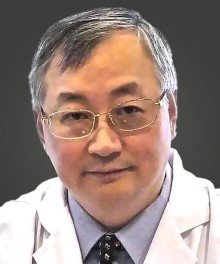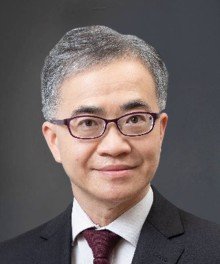- The thyroid gland is a butterfly-shaped gland located at the base of the neck, just below the laryngeal nodes. The thyroid gland is responsible for the production of hormones that regulate heart rate, blood pressure, body temperature and body weight.
- Thyroid cancer is the 16th most common cancer among men and the 5th most common cancer among women in Hong Kong. According to the Hong Kong Cancer Registry of the Hospital Authority, there were 1,059 reported cases of thyroid cancer in 2019, accounting for 3% of all cancers, with 236 cases in men and 823 cases in women, with a male to female ratio of about 0.3 to 1. The cumulative risk of thyroid cancer is 1 in 216 for men and 1 in 79 for women.
Risk factors
- Three times more common in women than men
- Radiation - including ingestion of radioactive material in the body or external exposure of the neck to radiation
- Family history - including familial medullary thyroid cancer, multiple endocrine neoplasia, Cowden's syndrome, and familial adenomatous polyposis syndrome
Symptoms
Thyroid cancer usually does not cause any signs or symptoms in the early stages of the disease. As thyroid cancer progresses, it may cause
- A lump (nodule) in the neck
- Changes in voice, including hoarseness
- Difficulty swallowing
- Sore neck and throat
- Swollen lymph nodes in the neck
Types of Thyroid Cancer
- Differentiated thyroid cancer: Includes papillary thyroid cancer and follicular thyroid cancer.
- Anaplastic thyroid cancer: A rare form of thyroid cancer that grows rapidly and is difficult to treat. It usually occurs in adults aged 60 years and older.
- Medullary thyroid cancer: Begins in the thyroid cells called C-cells and is hereditary in some cases.
- Rare types: thyroid lymphoma, thyroid sarcoma, etc.
Diagnosis and staging procedures
Fortunately, the majority of thyroid cancer cases in Hong Kong are detected at an early stage (80.8% of patients are diagnosed at stage 1), resulting in a high cure rate and a low mortality rate (less than 0.1% mortality to morbidity ratio). However, since dormant cancer cells can grow very slowly, there is still a possibility of recurrence many years later, so regular follow-up is needed.
The following procedures may be needed after diagnosis of thyroid cancer:
- Physical examination and health history: such as checking for neck lumps (nodules) or swelling, voice box and lymph nodes, and anything else that looks unusual
- Laryngoscopy: to see if the vocal cords are moving properly.
- Blood biochemistry and hormone studies: To check blood levels of thyroid stimulating hormone (TSH). TSH is produced by the pituitary gland in the brain. It stimulates the release of thyroid hormones and controls the growth rate of thyroid cells. Calcitonin and anti-thyroid antibodies may also be checked.
- Ultrasound: A process in which high-energy sound waves (ultrasound) rebound from the internal tissues or organs of the neck and produce an echo. The echoes form an image of the body's tissues, called a sonogram. The images can be printed out for later review. The procedure can show the size of a thyroid nodule and whether it is a solid or fluid-filled cyst. Ultrasound can be used to guide a fine needle aspiration biopsy.
- CT scan : A procedure that takes a series of detailed pictures of an internal area of the body (such as the neck) from different angles.
- Thyroid needle aspiration biopsy: A fine needle is inserted through the skin into the thyroid gland. Several tissue samples are removed from different parts of the thyroid gland. The pathologist looks at the tissue samples under a microscope to look for cancer cells.
- Surgical biopsy: A nodule or lobe of the thyroid gland is removed during surgery so that the pathologist can look at the cells and tissue under a microscope to examine for signs of cancer.
Treatment
Treatment of thyroid cancer depends on the patient's condition, i.e. type of tumor, size, location, degree of spread, patient's age and physical condition, etc. Surgery is the primary treatment for early thyroid cancer and is complemented by radiation therapy.
Surgery
Depending on the patient's condition, the surgeon may remove only the affected thyroid gland, or the entire thyroid gland. During surgery, the surgeon will also check the lymph nodes near the thyroid for cancer cells; if the cancer cells have begun to spread beyond the thyroid, the surgeon will remove the tissue near the thyroid as well.
Radioactive Iodine Therapy
This is a form of internal radiation therapy in which the patient takes a capsule containing radioactive iodine orally and is then hospitalized for 1-3 days in isolation to avoid the potential effects of radiation on family members. Cancer cells that are not completely removed or metastasized will absorb the iodine and be destroyed by the radioactive material, but normal cells will also be affected.
External radiation therapy (radiotherapy)
For cancer tumors that remain in the neck or cannot be removed surgically, doctors will consider external radiation therapy.
Chemotherapy
These are systemic treatments that use cytotoxic drugs to kill cancer cells, but chemotherapy is very rarely used in thyroid cancer cases unless the cancer has spread or recurred after despite all other treatments.
Hormone therapy
After the entire thyroid gland is removed, thyroid hormone replacement therapy is required. In case there are still residual thyroid cancer cells in the body, adjusting the thyroid hormone replacement agent to the appropriate dose can also help to inhibit the re-growth of cancer cells.
Targeted therapy
Targeted therapy is a treatment that uses drugs or other substances to identify and attack specific cancer cells. Compared to chemotherapy or radiation therapy, targeted therapies usually cause less damage to normal cells. There are different types of targeted therapies.
- Tyrosine kinase inhibitor: Tyrosine kinase inhibitor therapy blocks the signals needed for tumor growth e.g. sorafenib, lenvatinib, vandetanib, cabozantinib, selpercatinib, larotrectinib, and entrectinib. These are used to treat certain types of thyroid cancer.
- Protein kinase inhibitor: Protein kinase inhibitor therapy blocks proteins that are needed for cell growth and may kill cancer cells. Dabrafenib and trametinib are used to treat undifferentiated thyroid cancers with certain mutations in the BRAF gene.





















